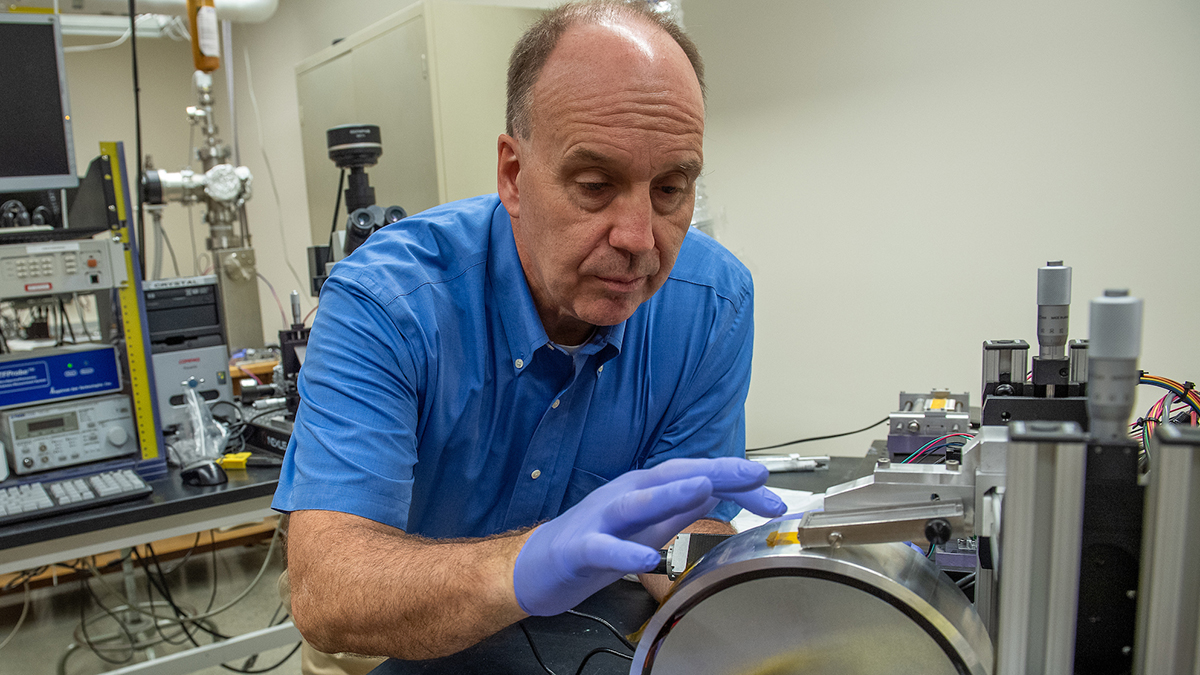The University of Vermont has awarded SPARK-VT grants of $50,000 to three faculty research teams to help them commercialize their work and move it a step closer to the marketplace.
The Ventalect
Critical care and pulmonary specialist Prema Menon, M.D., Ph.D., an assistant professor of medicine, won for a tool called Ventalect that allows ICU patients with acute respiratory failure on mechanical ventilation to communicate, even though they are unable to talk.
Menon and her team worked with students from UVM’s College of Engineering and Mathematical Sciences to develop the prototype – a tablet enabled with Menon’s algorithm and two-button controller – designed to serve the estimated 800,000 patients in the U.S. who are awake and need to be able to participate in their own treatment decision-making.
“The device is novel, because it is based on experiences of patients, family members, and clinicians and it allows for patients to initiate communication independently,” Menon said.
Microslot Writer
Physics professor Randall Headrick won for the Microslot Writer, a tool that can apply a liquid solution containing molecules that act as semiconductors to a flat surface. When the liquid evaporates, the semiconductors are left behind as a thin film of large grain crystals. The process is a simpler, cheaper and more efficient way of printing semiconductors than traditional methods.
While the technology could have many uses, Headrick’s SPARK-VT application focused on using the device to apply semiconductors that function as solar panels to a flat surface. Headrick has previously patented a “pen-writer” system that applies the crystals in a line. The new technology is a writing “head” that allows them to be rolled on a surface.
“The core idea is to get as close as possible to be able to paint solar panels on the side of a house,” Headrick said.
Headrick will use the SPARK-VT award to create a prototype Microslot Writer specially geared to producing solar panels. He plans to work with industry partners, including Omega Optical in Brattleboro Vt., to develop the technology. The thin film solar market is a multi-billion market, Headrick said.
Augmented reality system for ground-penetrating radar
Dryver Huston and Tian Xia in UVM’s College of Engineering and Mathematical Sciences won for further development of their “cognitive ground penetrating radar” system.
The team has won two previous SPARK-VT awards for the technology, which can peer up to 12 feet underground to detect buried infrastructure at a construction site, giving developers and planners a tool that could vastly speed the permit approval process, which can take two years in a major city.

The new award will be used to further develop the augmented reality portion of the project – which converts in real time a variety of inputs, including radar scans, into high quality images of underground objects that a non-specialist on- or off-site can read and understand.
The technology earned a Smart 50 Award from U.S. Ignite and other funders and was featured at the National Smart Cities Conference in 2018.
At UVM’s annual SPARK-VT competition, faculty pitch their commercialization ideas to a panel of experts who challenge them with questions, then deliberate in private before announcing the winning teams.
“Congratulations to all three teams for submitting high quality entries with great potential,” said Richard Galbraith, UVM’s vice president for research. “All three entries show a high degree of sophistication, both in their underlying science that drives the innovation and in faculty’s grasp of the realities of the marketplace.”
SPARK-VT is designed to help bridge the divide between research and the marketplace by bringing promising researchers together with business innovators and biotech leaders. The program offers frequent workshops to faculty interested in commercializing their research on topics ranging from intellectual property to market analysis to the art of the pitch. A select group of faculty who’ve submitted SPARK-VT proposals are invited to make presentations to a panel of 12 leaders from biotech, pharmaceutical, business, engineering, finance and legal fields. Panel members ask questions, challenge presenters on the details of their plans and offer suggestions. The $50,000 seed funding comes from UVM’s Office of the Vice President for Research and Office of the Provost.
Since its launch in 2012, SPARK-VT has funded 21 faculty proposals. It has spawned three start-up companies and has been a factor in faculty being awarded 23 Small Business Innovation Research (SBIR) and Small Business Technology Transfer (STTR) grants from the federal government.
Source: UVM News

